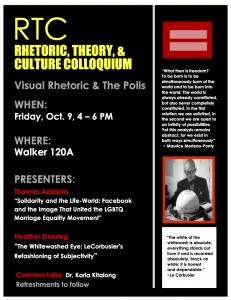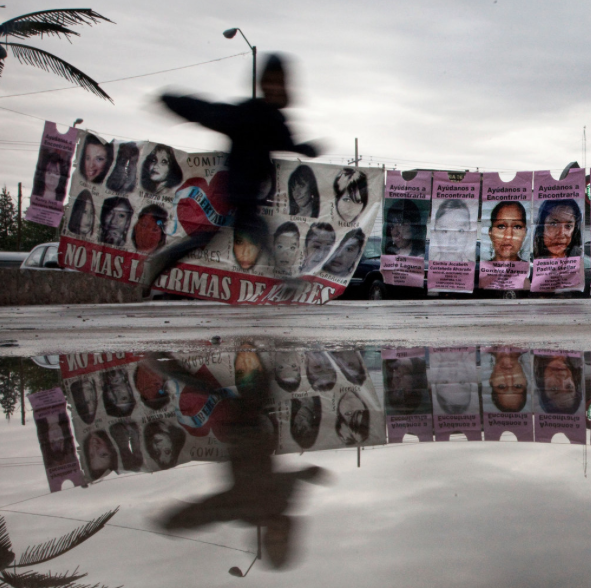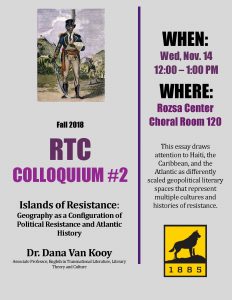 Please join the Department of Humanities for a Rhetoric, Theory and Culture Colloquium on Wednesday, November 14 titled “Islands of Resistance.” Dana Van Kooy, associate professor of english in transnational literature and literacy theory and culture, will present “Islands of Resistance: Geography as a Configuration of Political Resistance and Atlantic History” (see abstract below). This essay draws attention to Haiti, the Caribbean, and the Atlantic as differently scaled geopolitical literary spaces that represent multiple cultures and histories of resistance.
Please join the Department of Humanities for a Rhetoric, Theory and Culture Colloquium on Wednesday, November 14 titled “Islands of Resistance.” Dana Van Kooy, associate professor of english in transnational literature and literacy theory and culture, will present “Islands of Resistance: Geography as a Configuration of Political Resistance and Atlantic History” (see abstract below). This essay draws attention to Haiti, the Caribbean, and the Atlantic as differently scaled geopolitical literary spaces that represent multiple cultures and histories of resistance.
Please join us 12 p.m. (noon) Wednesday, November 14 in Rozsa Center room 120 (choral room).
Abstract:
Islands of resistance. The phrase commonly refers to isolated pockets of organized and oppositional force. Significantly, when interpreting the phrase, the emphasis falls more on the geographical features of an island than on the refusal to comply. The geographical imagery encircles and confines resistance: limiting its effectiveness to a series of singular actions or to a small, containable collective movement. In the cultural imaginary, the island represents a point of stasis in the midst of an immensely larger—very fluid and indomitable—natural force. However, the island’s characteristics—its isolation, its remoteness from everywhere else, and its unique ecology—also produce a synecdoche: the world is an island. What I find relevant here is how geographical markers reconfigure the politics of the phrase, both positively and negatively.
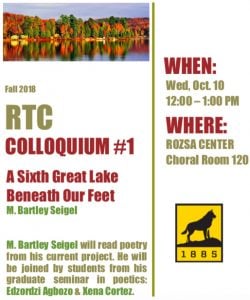 The Department of Humanities is pleased to announce the first Rhetoric, Theory and Culture Colloquium of the semester titled A Sixth Great Lake Beneath Our Feet. Professor
The Department of Humanities is pleased to announce the first Rhetoric, Theory and Culture Colloquium of the semester titled A Sixth Great Lake Beneath Our Feet. Professor 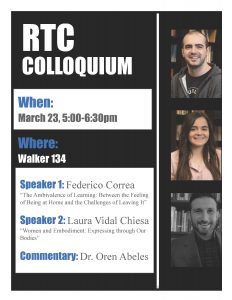 The Department of Humanities is pleased to announce a Rhetoric, Theory and Culture Colloquium to be held on Friday, March 23. RTC student Federico Correa will first present his talk “The Ambivalence of Learning: Between the Feeling of Being at Home and the Challenges of Leaving It” followed by RTC student Laura Vidal Chiesa presenting “Women and Embodiment: Expressing through Our Bodies.” Oren Abeles will be providing commentary to the presenters.
The Department of Humanities is pleased to announce a Rhetoric, Theory and Culture Colloquium to be held on Friday, March 23. RTC student Federico Correa will first present his talk “The Ambivalence of Learning: Between the Feeling of Being at Home and the Challenges of Leaving It” followed by RTC student Laura Vidal Chiesa presenting “Women and Embodiment: Expressing through Our Bodies.” Oren Abeles will be providing commentary to the presenters.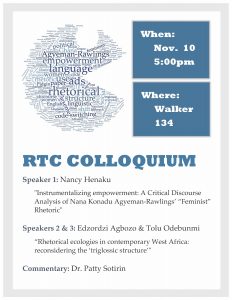 The Department of Humanities is pleased to announce a Rhetoric, Theory and Culture Colloquium to be held on Friday, November 10. RTC student Nancy Henaku will first present her talk “Instrumentalizing empowerment: A Critical Discourse Analysis of Nana Konadu Agyeman-Rawlings’ ‘Feminist’ Rhetoric” followed by RTC students Edzordzi Agbozo & Tolu Odebunmi presenting “Rhetorical ecologies in contemporary West Africa: reconsidering the ‘triglossic structure’.” Patty Sotirin will be providing commentary to the presenters.
The Department of Humanities is pleased to announce a Rhetoric, Theory and Culture Colloquium to be held on Friday, November 10. RTC student Nancy Henaku will first present her talk “Instrumentalizing empowerment: A Critical Discourse Analysis of Nana Konadu Agyeman-Rawlings’ ‘Feminist’ Rhetoric” followed by RTC students Edzordzi Agbozo & Tolu Odebunmi presenting “Rhetorical ecologies in contemporary West Africa: reconsidering the ‘triglossic structure’.” Patty Sotirin will be providing commentary to the presenters.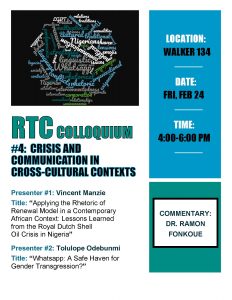 The Department of Humanities is pleased to announce a Rhetoric, Theory and Culture Colloquium to be held on Friday, February 24 titled “Crisis and Communication in Cross-Cultural Contexts.” RTC student Vincent Manzie will first present his talk “Applying the Rhetoric of Renewal Model in a Contemporary African Context: Lessons Learned from the Royal Dutch Shell Oil Crisis in Nigeria” followed by RTC student Tolulope Odebunmi presenting “Whatsapp: A Safe Haven for Gender Transgression?” Ramon Fonkoué will be providing commentary to the presenters.
The Department of Humanities is pleased to announce a Rhetoric, Theory and Culture Colloquium to be held on Friday, February 24 titled “Crisis and Communication in Cross-Cultural Contexts.” RTC student Vincent Manzie will first present his talk “Applying the Rhetoric of Renewal Model in a Contemporary African Context: Lessons Learned from the Royal Dutch Shell Oil Crisis in Nigeria” followed by RTC student Tolulope Odebunmi presenting “Whatsapp: A Safe Haven for Gender Transgression?” Ramon Fonkoué will be providing commentary to the presenters.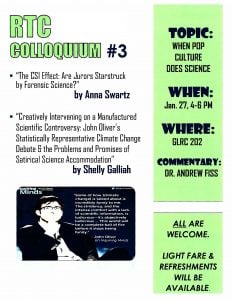 The Department of Humanities is pleased to announce a Rhetoric, Theory and Culture Colloquium to be held on Friday, January 27 titled “When Pop Culture Does Science.” RTC student Anna Swartz will first present her talk “The CSI Effect: Are Jurors Starstruck by Forensic Science?” followed by RTC student Shelly Galliah presenting “Creatively Intervening on a Manufactured Scientific Controversy: John Oliver’s Statistically Representative Climate Change Debate & the Problems and Promises of Satirical Science Accommodation.” Andrew Fiss will be providing commentary to the presenters.
The Department of Humanities is pleased to announce a Rhetoric, Theory and Culture Colloquium to be held on Friday, January 27 titled “When Pop Culture Does Science.” RTC student Anna Swartz will first present her talk “The CSI Effect: Are Jurors Starstruck by Forensic Science?” followed by RTC student Shelly Galliah presenting “Creatively Intervening on a Manufactured Scientific Controversy: John Oliver’s Statistically Representative Climate Change Debate & the Problems and Promises of Satirical Science Accommodation.” Andrew Fiss will be providing commentary to the presenters.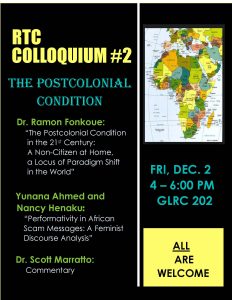 The Department of Humanities is pleased to announce a Rhetoric, Theory and Culture Colloquium to be held on Friday, December 2 titled “The Postcolonial Condition.” Associate professor of French and cultural studies, Ramon Fonkoué will first present his talk “The Postcolonial Condition in the 21st Century: A Non-Citizen at Home, a Locus of Paradigm Shift in the World” followed by RTC students Yunana Ahmed and Nancy Henaku presenting “Performativity in African Scam Messages: A Feminist Discourse Analysis.” Scott Marratto will be providing commentary to the presenters.
The Department of Humanities is pleased to announce a Rhetoric, Theory and Culture Colloquium to be held on Friday, December 2 titled “The Postcolonial Condition.” Associate professor of French and cultural studies, Ramon Fonkoué will first present his talk “The Postcolonial Condition in the 21st Century: A Non-Citizen at Home, a Locus of Paradigm Shift in the World” followed by RTC students Yunana Ahmed and Nancy Henaku presenting “Performativity in African Scam Messages: A Feminist Discourse Analysis.” Scott Marratto will be providing commentary to the presenters.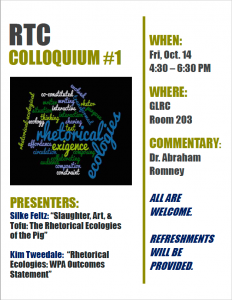 The Department of Humanities is pleased to announce a Rhetoric, Theory and Culture Colloquium to be held on Friday, October 14. RTC student Silke Feltz will first present her talk “Slaughter, Art, & Tofu: The Rhetorical Ecologies of the Pig” followed by RTC student Kim Tweedale presenting “Rhetorical Ecologies: WPA Outcomes Statement.” Abraham Romney will be providing commentary to the presenters.
The Department of Humanities is pleased to announce a Rhetoric, Theory and Culture Colloquium to be held on Friday, October 14. RTC student Silke Feltz will first present her talk “Slaughter, Art, & Tofu: The Rhetorical Ecologies of the Pig” followed by RTC student Kim Tweedale presenting “Rhetorical Ecologies: WPA Outcomes Statement.” Abraham Romney will be providing commentary to the presenters.